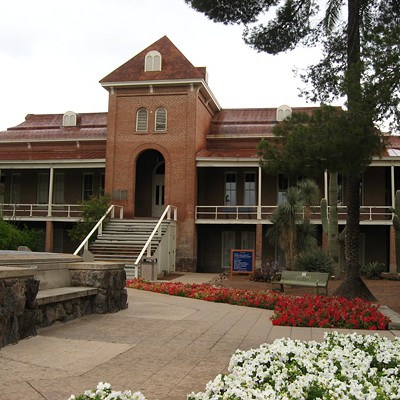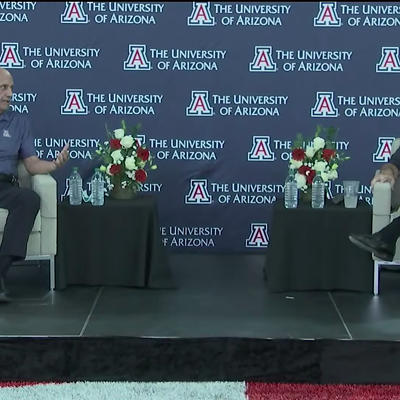Some of those tenants recently told Likins, "We're not moving."
University officials blame mold for the need to abandon the low-cost, 38-year-old facility, which houses an eclectic combination of international students, families and married couples. But skeptics contend that the real reason behind the eviction is the UA's never-ending pursuit of money: money realized by closing the units instead of repairing them; money saved by providing the displaced families with only minimal financial assistance in their search for new housing; money raised by rezoning and then selling the land for a residential and commercial development that is adamantly opposed by some of the surrounding neighbors.
Last year, the UA told Christopher City's residents that the complex would remain open three more years. By that time, the facility on Fort Lowell Road at Columbus Boulevard was to be replaced with two projects, one to house married students near campus, and another for families at an undetermined location.
Then arose the issue of mold, which can be a health problem for some people. While the UA had known about the mold for several years, according to Julia Rosen, industrial hygienist with the university's Risk Management department, the mold's ill effects were not understood until recently. But new information last fall, she says, made clear the health hazard associated with mold. Rosen admits, however, that "certainly a lot of people are living out at Christopher City without problems." And that calls into question the urgency of Christopher City's evacuation.
At the same time that the mold problem was creeping to the surface, university officials began working on rezoning the Christopher City property in anticipation of selling it for a substantial sum. As part of this process, UA Senior Vice-President for Business Affairs Joel Valdez asked the city to waive the $11,000 rezoning fee, but that request was rejected.
After the mold health risk came to light, university officials had to decide whether to clean it up, at an estimated cost of $2.6 million, or evict the tenants. Because the facility was to be demolished in three years anyway, the decision was to relocate the residents now.
That is when Likins' notice was taped to the tenants' front doors, in what some say was a malicious, devious and thoughtless manner. According to Martha McGrath, a three-year resident of Christopher City, "They really fucked up the way the notice was delivered. They gave it out during finals week so we couldn't organize" to oppose the forced move.
A few days after Likins' message, university officials announced they would provide financial assistance to the students to help them relocate. Payments ranging from $1,250 to $1,550 were made to cover moving expenses. The same check contained a rent differential of $1,200 to $2,688, depending on the size of the tenant's apartment. This amount was to help cover the cost of leasing a more expensive apartment for 12 months.
While university representatives consider this settlement generous, Arizona law allows much more to be done, especially for low-income renters. In similar situations, the City of Tucson provides 42 months of rent supplements to the people it displaces. The city's moving expense payments, however, are slightly less than the university provided.
In addition to allowing the more generous rent supplement, state law stipulates that "A person shall not be required to move from a dwelling because of any program or project undertaken by a displacing agency unless the displacing agency is satisfied that comparable replacement housing is available to the person."
But despite the university's obligation and financial assistance, some residents have found it impossible to obtain replacement housing. While most of Christopher City's tenants have either moved already or notified the university they will do so, 55 households still have not been able to find a new home.
"University officials have no concept of the lives of low-income residents," says Holly Reed, who has lived at Christopher City with her son for seven years. "Very few apartments fit in their price range and there are huge waiting lists. It's been impossible for me to find a comparable unit with the rent subsidy they're providing, especially when you have very little income. I called dozens of places without success and eventually gave up. By the end of my efforts, apartment managers would laugh at me and say nothing is open."
"I feel betrayed by the university," says Ashira Pace, a three-year resident of Christopher City. "They are just using the mold as a way to get rid of us. Many people got scared, grabbed the money and left. But the places I could afford were dumps."
"I found that a low-end three bedroom unit cost $850 without utilities," says Martha McGrath, who has two children living with her. "With the rent supplement the university is providing, I could make it for four months, then I'm out on the street."
These three women also have the added difficulty of working for the university as community assistants at Christopher City. So they are losing not only their homes, but also their jobs.
Reed, Pace and McGrath all agree that, as of now, they plan on still living at Christopher City on September 1, and expect other households will also remain there. "I'm staying until I find another place," Holly Reed insists.
The university's Associate Director of Residence Life, Pam Obando, understands that the relocation process has been tough for some people. But she says the university is pleased that 84 percent of the households so far have either left Christopher City or given their notice.
Obando says the university is working very hard to accommodate those who haven't been able to find somewhere else to live, and is looking at other options for them. She expects, however, that under present circumstances 25 or more households might still be without a new home by the August 31 deadline.
Tucson City Council member Carol West, who represents the area, wants the university to change that date. She wrote UA president Likins on June 19, asking him to "extend the deadline for vacation of the premises in any cases of extreme hardship." One month after sending her letter, West still hadn't received a response, but Obando says that the university is not intending to keep Christopher City open after August 31.
West believes it isn't only the loss of their homes that has some residents of the complex rebelling against the university. "There is also a lot of grieving going on over the loss of the community," she says, pointing to the special character that has developed in the facility. Asked about the university's handling of the Christopher City situation, West admits she is being diplomatic when she says only, "I'm disappointed there wasn't better communication earlier in the process. That was a big problem."
WHILE THERE ISN'T a lot the city government can do to help the still-remaining tenants of the complex, an item scheduled to be discussed by the city council on August 7 could make a difference. This proposal would change how applicants for public housing assistance would be ranked on a waiting list of 2,000 households. If the change is made, eligible persons displaced by government action would be first in line for openings.
According to Karen Thoreson, director of Tucson's Community Services department, it is just coincidental that this item is on the upcoming council agenda. She says it is primarily aimed at people who live in substandard housing that the city condemns, but it would also cover the low-income tenants of Christopher City. However, according to Thoreson, even if the council approves the change, it could take between four and eight months for someone to become eligible and either receive a Section 8 rental voucher or be placed in a public housing unit.
So while the UA reviews its options, some of the remaining residents of Christopher City are planning to continue to live at the complex after August 31. They don't see any other realistic choice, but wonder if the university will have them arrested after the deadline.
At the same time, in anticipation of selling the property, the university wants to rezone 59 acres at Christopher City for up to 700 new homes, along with eight acres for office and commercial development.
Adjacent neighbors generally support the residential component of the request, pointing out that it is about the density of the existing housing in the area.
But the proposed commercial rezoning at the corner of Fort Lowell and Columbus infuriates the neighbors, because all three other corners of the intersection are residential in character.
"There will be an incredible fight over the commercial rezoning request," says nearby resident Robert Schlesenger. "More commercial just isn't necessary because there is a lot of it in the area."
Another neighbor of the property, Clifford May, echoes those concerns. "The neighborhood committee that reviewed the rezoning proposal objected from the beginning to rezoning the corner for commercial use. Four or five meetings were held and we persisted with our opposition."
As Schlesenger sees it, "The commercial rezoning is about money, because the university's bottom line is that commercially zoned property is worth several times more than residential land." While the neighbors of Christopher City have made their opposition to the commercial rezoning known for months, as Schlesenger says, "The university will do exactly what they want, no matter what the neighbors want."
But, in this case, that might not be so easy. Before the university can have the property rezoned and sell it off for a tidy sum, it will have to go before the city's zoning examiner at a public hearing, which may be held as soon as August 24. Then the proposal will have to be reviewed and approved by the city council.
At least one council member looks dimly on the idea. Carol West says she is inclined to oppose it because she believes more discussions, and perhaps a planning process including all concerned parties, needs to be held first.
While university officials are worrying about the fate of their rezoning request and future cash flow from the sale of the land, some Christopher City residents have a more immediate worry: where they'll be living in September.
As Martha McGrath concludes, "My biggest fear in life has been having to live in a car with my kids. The university has done for me what I have fought against all my life, and that is to make me homeless."












